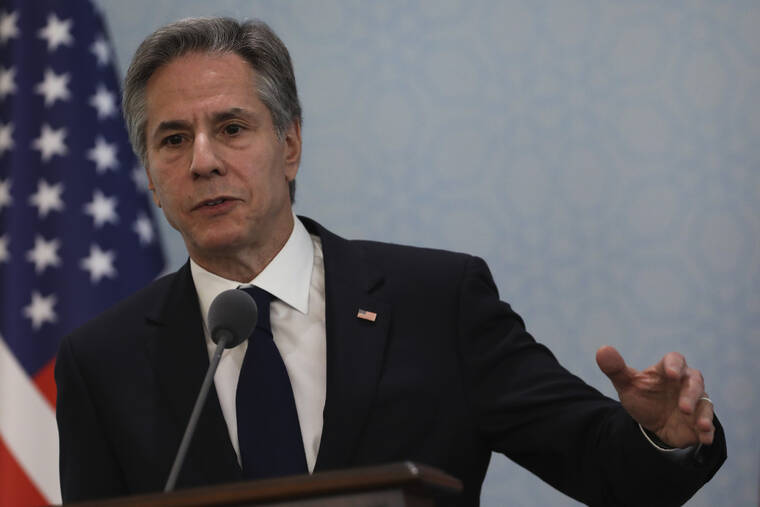WASHINGTON — Fresh from a meeting with China’s top diplomat and a U.N. Security Council session on Ukraine, Secretary of State Antony Blinken will travel to Central and South Asia next week for international talks that will put him in the same room as his Chinese and Russian counterparts.
The State Department said Blinken would travel to the former Soviet republics of Kazakhstan and Uzbekistan before going to India for a meeting of the Group of 20 foreign ministers from the world’s largest industrialized and developing countries, including China and Russia.
The trip comes as tensions have soared between the U.S. and Russia and between the U.S. and China over Russia’s war in Ukraine and Chinese assertiveness in the Indo-Pacific. All three countries are competing fiercely to outdo each other in global influence.
Underscoring the challenges the U.S. faces, the three countries Blinken will visit were all among the 32 nations that abstained in Thursday’s U.N. General Assembly vote that condemned Russia’s invasion of Ukraine by a vote of 141-7.
“It’s clear to us that the countries of Central Asia and India have had long, complex relations with Russia,” said Donald Lu, the top U.S. diplomat for the region, on Friday. “I don’t think they’re going to end those relations anytime soon, but we are talking to them about the role they can play in this conflict.”
Lu added: “We may not share the same approach every day on Ukraine, but I think we do share the goal that this conflict ends and it ends based on principles in the U.N. charter.”
U.S. officials have been tight-lipped about the prospects for Blinken sitting down with Chinese Foreign Minister Qin Gang or Russian Foreign Minister Sergey Lavrov in New Delhi. But all three will be present in the Indian capital for the G-20 meeting.
“A major multilateral summit like the G-20, of course, lends itself to the potential for bilateral engagements on the margins, but we don’t have any specific scheduling updates to offer,” deputy State Department spokesman Vedant Patel said. He added, though, that “the United States believes it’s important to keep the lines of communication open.”
The last time the G-20 foreign ministers met — in Bali, Indonesia, in 2022 — Blinken held extensive talks with China’s then-foreign minister, Wang Yi, that led to a summit between President Joe Biden and Chinese leader Xi Xinping in November.
And Wang, who has since been promoted, met with Blinken last weekend on the sidelines of the Munich Security Conference in Germany, the first high-level talks since the U.S. shot down a suspected Chinese surveillance balloon and Blinken postponed a much-anticipated trip to Beijing.
A meeting between Blinken and Qin, who was formerly China’s ambassador to the U.S., would be their first in Qin’s current capacity.
The broader G-20 meeting is expected to focus on food and energy security, especially for developing countries, which have been hit by fallout from the Ukraine conflict. In Bali, a number of nations that have not outright condemned Russia for the war expressed deep concern about its impact on the prices and supply of food and fuel.
Before traveling to Delhi, Blinken will visit the Kazakh capital of Astana for talks with leaders there as well as a meeting of the so-called C5+1 group, made up of the U.S. and the former Soviet republics of Kazakhstan, Kyrgyzstan, Tajikistan, Turkmenistan and Uzbekistan.
At that meeting, he will stress the U.S. “commitment to the independence, sovereignty, and territorial integrity of Central Asian countries,” the State Department said in a statement that mirrors the wording it has been using to support Ukraine against Russia.
Blinken will then go to Tashkent for talks with Uzbek officials.




